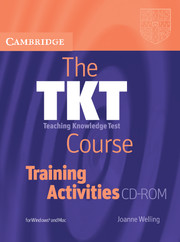2.6 - Dictionary explorer
Published online by Cambridge University Press: 09 February 2024
Summary
The TKT exam often contains a sample dictionary entry for one headword which candidates have to show they can decipher. This activity allows trainees to test their dictionary skills and become familiar with the different entries and the glossary terms likely to be tested.
Instructions
1. Explain that you are going to do a quiz which is quite difficult and that you do not expect the trainees to know all the answers. Explain that the purpose of the quiz is not to test trainees’ language knowledge. It is an informal diagnostic assessment to help trainees focus on their familiarity with dictionary entries and how to use them.
2. Hand out one copy of the quiz to each trainee and allow them just five minutes to read it quickly and predict the answers. They can also predict their own score out of fifteen if this quiz were to be graded now.
3. Explain that trainees are allowed to do a little more research before the quiz is graded. Write the question numbers 1–15 on the board. Ask trainees which question numbers they feel most confident about and erase between three and five of these. Of the remaining question numbers, have trainees volunteer to check the answer to one of the questions from the quiz in the dictionary (several people can check the same question).
4. Hand out the dictionaries and allow time and guidance to find the correct answers. This may involve the trainees looking up the three headwords in different dictionaries, conferring and asking for help with dictionary symbols and abbreviations. Early finishers may select another question number to research. Monitor, model and feed in.
5. Mark the quiz as a whole group. Have trainees feed in and explain as much as possible from their dictionary discoveries.
Answer key
1. Yes. All entries show stress marked on the second syllable. comPARE conTRAST reVISE
2. No. Suggest and provide are similar in that they both can be followed by that, but aim has a completely different verb pattern. Look for the bolded words inside square brackets in the verb entry. [+ to INFINITIVE ] [-ing VERB] [+ that]
- Type
- Chapter
- Information
- The TKT Course Training Activities , pp. 62 - 63Publisher: Cambridge University PressFirst published in: 2024

